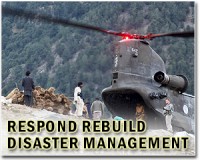| . |  |
. |
Tokyo (AFP) April 17, 2011 US Secretary of State Hillary Clinton pledged full support for quake-hit Japan on Sunday as the operator of its stricken nuclear plant said it expects to achieve "cold shutdown" in six to nine months. Japan's embattled Tokyo Electric Power Company (TEPCO) offered the timeline more than five weeks after a giant quake and tsunami hit the Fukushima Daiichi plant, which has since leaked radiation into the air, soil and sea. Clinton on a brief, largely symbolic stop in Tokyo, voiced solidarity and vowed that the United States would "do everything we can to support you as you come through this time of trial". "And we know you will emerge even stronger than before," she said after meeting Foreign Minister Takeaki Matsumoto. Since the March 11 disaster, US forces stationed in Japan and beyond have launched a round-the-clock relief effort bringing supplies to the battered coast -- dubbed Operation Tomodachi, which means "friend" in Japanese. Prime Minister Naoto Kan later told Clinton: "We will never forget, and we will keep an enduring memory of the very robust support the United States has provided." Clinton also highlighted the support of American business leaders and had tea with Emperor Akihito at the Imperial palace -- an unusual invitation from the monarch to a non-head of state. "I'm so, so sorry for everything your country is going through," said Clinton, who shook hands with Akihito and kissed Empress Michiko on the cheek. Clinton and Matsumoto said that they were launching a business partnership to support Japan's reconstruction on its northeastern coast, where 13,778 people have been confirmed dead and more than 14,000 are still missing. While details were vague, the heads of the US Chamber of Commerce and Japan's business lobby Nippon Keidanren said they would meet on ways that foreign companies can take part in the massive rebuilding. Washington hopes that the large-scale response can help reshape attitudes in Japan, which has been a staunch US ally for decades, but where many citizens bristle at what they see as American domination. The United States stations some 47,000 troops in Japan under a post-World War II security treaty, often leading to friction with host communities for the military bases, especially on the southern island of Okinawa. Matsumoto said America's help had enabled Japanese people to "feel secure with the Japan-US alliance, including the US military in Japan". US helicopters have flown aid missions from an aircraft carrier, marines helped clear the tsunami-ravaged Sendai airport which reopened last week, and thousands joined a search of the coastline for bodies. American nuclear experts have also helped with advice on stabilising the tsunami-hit Fukushima plant, where the US military has flown in coolants and deployed freshwater barges and fire engines to help douse hot reactors. TEPCO's chairman Tsunehisa Katsumata said at a press conference that the utility aims to cool reactors and start reducing radiation from the explosion-charred facilities within three months. Within six to nine months, TEPCO said in a statement, it expects to achieve "cold shutdowns" of all the six reactors, a stable condition in which temperatures drop and radiation leaks fall dramatically. TEPCO also said that an initial focus would be on preventing new hydrogen explosions in reactors by injecting nitrogen, and on avoiding further releases of radioactive water into the environment. Trade and industry minister Banri Kaieda said that the roadmap would help move the nuclear crisis from the emergency phase into a stabilisation phase, but he also prodded TEPCO to move faster than the roadmap suggests. In the short term, TEPCO said earlier, it would send two US-made remote controlled robots into a reactor building damaged by a hydrogen explosion to gauge radiation and temperature levels. Further north, in the tsunami-shattered town of Rikuzentakata, survivors celebrated a rite of spring as they seek to move on from the catastrophe that shattered so many lives. About 200 residents cracked open the sake, held barbecues and sang songs at a traditional "hanami" party held under blossoming cherry trees, a symbol in Japan of the fleeting beauty and fragility of life.
Share This Article With Planet Earth
Related Links Bringing Order To A World Of Disasters A world of storm and tempest When the Earth Quakes
 Clinton visits Japan as US disaster relief warms ties
Clinton visits Japan as US disaster relief warms tiesTokyo (AFP) April 17, 2011 US Secretary of State Hillary Clinton visits Japan Sunday, reconfirming a key alliance that has been strained by a lingering military base dispute but boosted by a strong American disaster relief effort. Since Japan's massive quake and tsunami struck on March 11, sparking an ongoing nuclear crisis, US forces have launched a muscular search, rescue and relief effort with 20,000 troops and sco ... read more |
|
| The content herein, unless otherwise known to be public domain, are Copyright 1995-2010 - SpaceDaily. AFP and UPI Wire Stories are copyright Agence France-Presse and United Press International. ESA Portal Reports are copyright European Space Agency. All NASA sourced material is public domain. Additional copyrights may apply in whole or part to other bona fide parties. Advertising does not imply endorsement,agreement or approval of any opinions, statements or information provided by SpaceDaily on any Web page published or hosted by SpaceDaily. Privacy Statement |